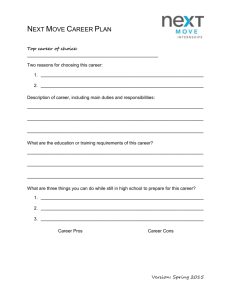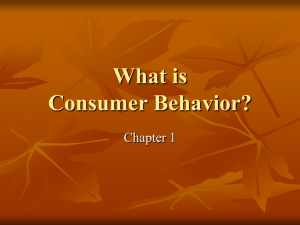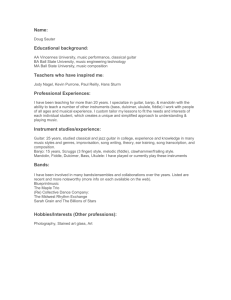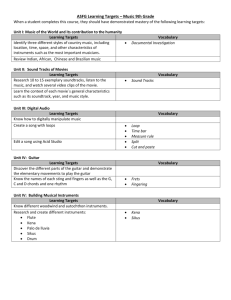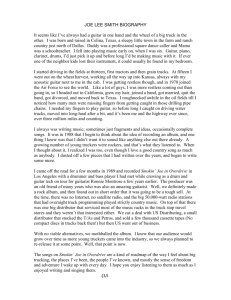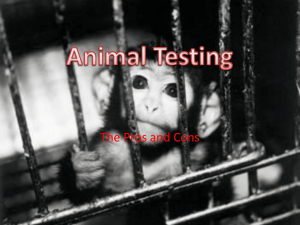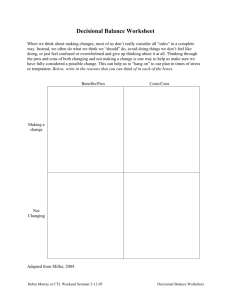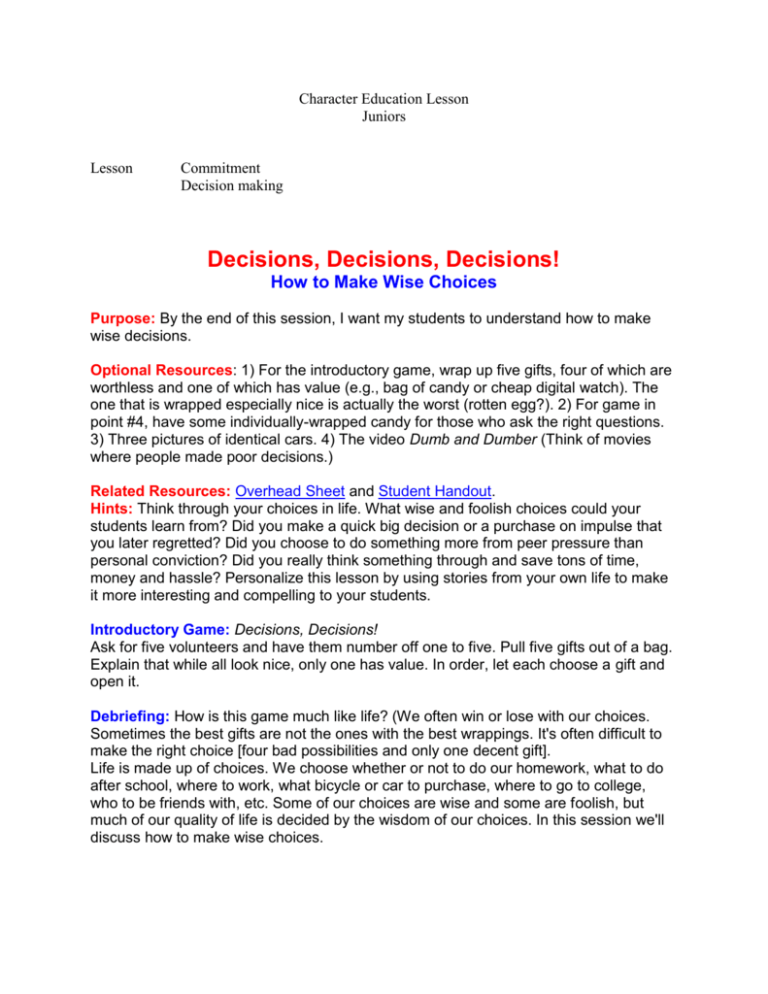
Character Education Lesson
Juniors
Lesson
Commitment
Decision making
Decisions, Decisions, Decisions!
How to Make Wise Choices
Purpose: By the end of this session, I want my students to understand how to make
wise decisions.
Optional Resources: 1) For the introductory game, wrap up five gifts, four of which are
worthless and one of which has value (e.g., bag of candy or cheap digital watch). The
one that is wrapped especially nice is actually the worst (rotten egg?). 2) For game in
point #4, have some individually-wrapped candy for those who ask the right questions.
3) Three pictures of identical cars. 4) The video Dumb and Dumber (Think of movies
where people made poor decisions.)
Related Resources: Overhead Sheet and Student Handout.
Hints: Think through your choices in life. What wise and foolish choices could your
students learn from? Did you make a quick big decision or a purchase on impulse that
you later regretted? Did you choose to do something more from peer pressure than
personal conviction? Did you really think something through and save tons of time,
money and hassle? Personalize this lesson by using stories from your own life to make
it more interesting and compelling to your students.
Introductory Game: Decisions, Decisions!
Ask for five volunteers and have them number off one to five. Pull five gifts out of a bag.
Explain that while all look nice, only one has value. In order, let each choose a gift and
open it.
Debriefing: How is this game much like life? (We often win or lose with our choices.
Sometimes the best gifts are not the ones with the best wrappings. It's often difficult to
make the right choice [four bad possibilities and only one decent gift].
Life is made up of choices. We choose whether or not to do our homework, what to do
after school, where to work, what bicycle or car to purchase, where to go to college,
who to be friends with, etc. Some of our choices are wise and some are foolish, but
much of our quality of life is decided by the wisdom of our choices. In this session we'll
discuss how to make wise choices.
Opening Discussion: Think through some of your worst and best choices in life:
something you bought and later regretted buying, a moral choice that got you in trouble,
a vacation your family took that stunk, a choice you made that paid off. Will any of you
share these choices with us? How could some of the poor choices have been
prevented? What contributed to the good decisions?
Imagine that your best friend David has been earning money all summer and is about to
make a big choice:
Do I purchase that guitar I've always wanted, or keep saving toward a car?
Rather than tell him what you think, you decide to ask him some questions to help him
think through his decision wisely. What would you ask him? (Write down their ideas on
the board.) What you're telling me is that there are principles of decision-making that
can keep us from making stupid decisions. Let me give you a simple acrostic that many
of these principles can fit under. (Show it on the overhead. Then, we'll discuss each
one.)
D esires: What do I want to do?
E quipped: Am I able or qualified to do it?
C ircumstances: Are my circumstances, including timing, favorable?
I nput: What do friends, family, and experts recommend?
S mall Steps First: Can I test the water before taking the plunge?
I n Line With My Mission: Does this help me achieve my mission/vision/purpose in life?
O ptions: Have I considered all the options?
N ever Compromise: Is it consistent with my core values?
S ort Pros and Cons...Then decide!
Making It Practical: In order to make this super practical, write down a couple of big
decisions you'll need to make over the next few years. (Summer job, who to date,
school to attend, vocation, instrument to play, which car to buy, etc.) As we explore
each principle, think of how it might help you in making your decision.
(By the way, for those of us who get kind of compulsive about things, don't pull out
these these principles every time you try to decide between a Big Mac and a Quarter
Pounder at McDonalds. In that case, just do what your stomach tells you! We're talking
about life's bigger decisions.)
#1 - Desires: What do I want to do?
Discussion: All other things being equal, do you think you'd do better at a career that
you loved, or one that you hated? Why? (If you love it, you'll attack the job each day
with excitement and thus do better at it.) Does it follow that everyone should simply find
out what they love and find a way to make a living at it? (I suppose this has it's limits, or
90% of the boys would want to play video games for a living. And the odds are slim of
becoming a successful rock star. Rather, let's expose ourselves to various kinds of work
to see what we most enjoy. Some jobs can start as drudgery, but grow on us over time.
Our interests often change as we get older.)
Illustration: Warren Buffett, America's second wealthiest man, made his billions by
investing in great companies. Predictably, he loves what he does. He speaks of arriving
at the office and dancing a jig every morning, before he starts studying the intricate
details of companies.
Caution: Just because you have a passion doesn't mean you should exclusively
pursue that passion.
Illustration: It's difficult to make a full-time living as a musician. I was recently reading
up on an incredibly talented Swedish metal band. Being that they were all incredible
musicians, I assumed they played full-time. Yet I discovered in their interviews that each
member held down regular jobs, one as an Internet Technology professional. Don't put
all your eggs in one basket. It's hard to make a living in some fields. Also, these days
people may work different careers throughout their lifetimes.
Applying the Principle: Back to your friend David. Concerning desires, he wants the
guitar more than the car. Besides, he's just 14-years-old and won't be able to drive for a
couple of years. It would be more fun to have a guitar now than to continue saving for
the car. Do your desires impact any of your decisions?
#2 - Equipped: Am I able or qualified to do it?
If you’re five foot, one inch tall and can’t jump, you probably shouldn't consider making
your mark on the basketball court!
Illustration: Warren Buffett studied under a great economist and worked for him in
college. His interest in the economics, businesses and investing, plus his mental
aptitude allowed him to succeed at understanding and investing in great companies.
''Maintaining focus is a key to success. You should understand your circle
of competence, the thing that you're good at, and spend your time and
energy there.'' (Bill Gates, Column, New York Times Syndicate, March 12,
1997)
Discussion: On the other hand, since you're still young, can you fully know your
abilities? (Although aptitude and vocational tests can be helpful, remember that you're
still young and developing.)
Illustration: George Lucas, successful director of such movies as Star Wars, cared
only about racing cars while he was in high school. It wasn't until he seriously wrecked
his car that he explored other life options.
Illustration: Winston Churchill didn't respond well to school. He was put in remedial
reading. His father was ashamed of his dullness and was certain he would never be
able to earn a living in England. He would later be considered one of the greatest
leaders of the 20th century. (Cradles of Eminence, p. 264)
Illustration: Albert Einstein's parents and teachers considered him dull. His son once
said, ''He was even considered backward by his teachers. He told me that his teachers
reported to his father that he was mentally slow, unsociable and adrift forever in his
foolish dreams.'' At 16, his father ''urged him to forget his 'philosophical nonsense' and
apply himself to the 'sensible trade' of electrical engineering. A slowness of speech had
predisposed his parents to think him dull.'' He also found learning languages difficult. He
failed to pass his college entrance exams in zoology, botany and languages. Because
of this, he had to return to secondary school for another year. (Cradles of Eminence, p.
248ff)
Discussion: What can we learn from these examples? (Our gifts and desires might not
be evident during our teen years. So, don't get discouraged!)
Also, don't limit your education to your narrow set of interests!
Illustration: Joe Louis reigned for eleven years, eight months as boxing's heavyweight
champion of the world, longer than anyone else in history. But although he was
incredibly wise in boxing, he was foolish with his money. First, he took bad advice from
an accountant who told him to delay paying the taxes he owed from his earnings. He
should have gotten a second opinion. This failure cost him dearly.
Second, he spent his money wildly and never saved. Sadly, this potentially wealthy man
remained in debt for the rest of his life. It's so easy to be selectively wise - brilliant in one
area but foolish in another. (Source: Joe Louis, A Champ for All America, by Robert
Lipsyte, Harper Collins Publishers, 1994, pp. 5, 74,75)
It's common to read of super-successful actors and musicians who made millions, but
now owe millions because of unscrupulous managers or their inability to handle money.
That's why Tiger Woods went to college and majored in Accounting and Business. He
already knew golf, but knew he'd need to understand finances to manage his earnings
well.
In sum, consider your abilities and interests, but don't think you can know them fully as
a teen.
Hint: If you're trying to make vocational decisions, consider taking a vocational
inventory to help match your interests and abilities with the job market. Your school
counselor can suggest one.
Applying the Principle: David's been playing for a year on a mediocre guitar and his
guitar teacher and friends all believe that he has talent. Does your talent impact
impact any of your decisions?
#3 - Circumstances: Are my circumstances, including timing, favorable?
Circumstances can include financial limitations, current commitments and timing.
Sometimes we need to wait on the right circumstances, especially with big decisions.
One person who works with prisoners said that most people he knew in prison were
there because they thought they had to have something now.
Discussion: Think about the decision you're trying to make. Is this the best time to
make that purchase or that decision? (For example, perhaps you should wait till you're
out of school to think of getting married. Although you might want a car like crazy, it
might be wiser to borrow a parent's car when you need one and save your money to
buy it outright rather than face payments.)
Illustration: When Bill Gates was deciding on whether or not it was time to put his fulltime effort into Microsoft, he knew that other programmers were racing to create the first
operating software for personal computers. Had he waited, Microsoft may have never
been able to catch up and dominate the software industry.
Applying the Principle: David feels he's got plenty of time to save for a car, especially
if he doesn't intend on getting an incredibly expensive guitar and car. What
circumstances might affect your decisions?
#4 - Input: What do friends, family, and experts recommend?
You've got to ask! Asking is, in my opinion, the world's most powerful -and neglected -- secret to success and happiness. (Percy Ross)
A person who asks a question might be a fool for five minutes, but a
person who doesn't ask, is a fool forever...
Discussion:
What are some of the reasons that we resist getting input from our parents and
friends? (1 - Pride. 2 - The nagging feeling in the back of our minds that what
we're about to do is really stupid, but we want to do it anyway. 3 - The extra
effort.)
Why should we get advice from others? (We learn from their wisdom and
experiences. We don't have to make the same mistakes they made.)
Who to ask:
Friends: They can share from their experience.
Parents and family: They know us in ways others don't.
Experts: Talk to salesmen at various stores who know their products. Read
books or consumer reports.
Your faith family: Many report that religious guidance through prayer or
respected clergy have helped them to make difficult decisions.
Discussion: How might this apply to the decision you're trying to make?
The Question Game: In order to make the most of wise counsel, we've got to be
able to ask the right questions. Let's try to sharpen this skill. (Put up pictures of
three used cars. All are the same model and look exactly the same.) Imagine that you're
ready to purchase a car, have decided on the kind of car you want and have found three
of them. Yet, there are factors that you don't see that make big differences in their
worth.
I'm an ethical used car dealer who will answer any of your questions honestly. In my
hand I've got all the specifics you would need to know about these cars to make a
decision between them. You're challenge is to ask the right question or look carefully at
the right part of the car. Your object is to choose the one that's the best value and the
least hassle. Each car has something going against it that you can't see from the
picture. (Let students randomly ask questions till they find what's being hid about each
car. When someone uncovers a flaw, throw them candy.)
Car #1
Car #2
Car #3
Mileage: 50,000
Mileage: 50,000
Mileage: 50,000
One owner.
One owner.
One owner.
Wrecked seriously in 1999: No wrecks.
No wrecks.
repaired and repainted. Rust Heat and air work.
One owner.
showing under front part of Power window on driver
Transmission shifts rough.
car.
side doesn't work. Needs
Perhaps needs new
estimated $150.00 repair
transmission for $3,000.00.
Leaking oil, going through a work.
Heater doesn't work.
quart a week - possible
Possible $500.00 to repair.
need of new engine block at
cost of $4,000.00
Joke: In this game, we had an honest car salesman. In the real world, some come
across nice and helpful, but will lie to your face. To prepare you for the real world, here
are some helpful definitions to keep in mind (put on overhead).
''Owned by a doctor'' - And driven by his son in drag races.
''Never been raced'' - Former owner too embarrassed.
''Low Mileage Car'' - We turned the speedometer way back.
''Driven only 11,000 miles'' - And towed the rest of the way.
''Fair condition'' - Some paint is left.
''Transportation car'' - Some car is left.
''Rebuilt Engine'' - We cleaned the spark plugs.
''One owner car'' - Man by the name of Hertz (rental company).
''Cream Puff'' - Was in a head-on collision with a milk truck.
''Undercoated'' - With rust.
''Second car'' - There were only two cars in the race.
''Doesn't burn oil'' - It drips out before it has a chance to burn.
''Reconditioned'' - With the cheapest seat covers we could find.
''As is'' - Bring your own shovel.
''Must be sold this week'' - The Health Department is getting nasty again.
(Found in Pilgrim Press Brochure)
Application - Buying a Guitar: Benji wanted to purchase a nice guitar and amp.
Rather than go to a guitar store and talk to only one salesman, he and his dad got
advice from his guitar-playing friends and several stores. He learned what guitars
sounded best for the style he wanted to play; which were the most versatile; the pros
and cons of used versus new. Because of getting wise counsel, he's got a guitar that he
really likes.
Application - Buying a Car: Andrew needed a car. Rather than go directly to a car
dealer to pick out the coolest-looking car, he and his dad did some research from
authoritative experts on the internet. Before they started looking, they narrowed down
their choices to some brands that were reliable, inexpensive to operate (fuel
consumption and insurance), safe, and in a style that he liked.
www.consumerreports.com told him which cars customers were most satisfied with and
were most reliable. www.BlueBook.com told him how much he should pay for this car.
www.clarkhoward.com and www.cars.com gave lots of good advice on purchasing a
sound vehicle at a good price. (About 40 percent of car buyers review Consumer
Reports before they make a car buying decision.)
Application - Should I marry this girl? While Steve was dating, he read some books
by marriage counselors to find out what kind of person it took to make a good marriage.
When he got serious with someone, before he popped the big question, he asked some
mutual friends what they thought of the relationship, and what they thought would be the
strengths and weaknesses of their relationship. He'd seen lots of people "fall in love,"
but discovered that many of them didn't "fall into a good marriage." He wanted an
outside opinion. His friends encouraged him that they were right for each other, but
were also honest to point out areas that would be frustrations. Their encouragement
gave him a green light to pop the big question. And the problems they foresaw gave him
a more realistic view of what to expect for the marriage relationship.
If you are considering pursuing a certain vocation, talk to people who are in the field or
take a vocational test inventory.
We all learn by experience, but it's much less costly to learn from other's experience.
Applying the Principle: David's parents knew that he would need a car to drive to work
when he turned 17, so they were concerned that the guitar might set him back too far
financially. David talked to several other people, who recommended that he could get a
great-sounding used guitar that would hold its value. Even if he ended up needing that
money for a car later, he could sell the guitar for close to the same price after a couple
of years. This reassured his parents, so that they were okay with either decision. What
friends, family or experts could you consult about your decision?
#5 - Small Steps First: Can I test the water before taking the plunge?
Illustration: Richard was majoring in Aerospace Engineering at Georgia Tech, but
decided to Co-Op (alternating being in school one quarter with working the next quarter)
in order to get work experience. By working with a mechanical firm, he discovered that
he enjoyed the building industry. He changed his major to Mechanical Engineering and
now enjoys working for a major company. By getting some practical experience, he
found what he really enjoyed doing.
Illustration: Steve loved music, playing trumpet in the band. Since it would be difficult
to make a living playing trumpet, he thought he should major in music and become a
high school band teacher. But first, he got his feet wet by teaching some private trumpet
lessons to a younger student. He hated it and decided on a different career.
Illustration: Many top people in their fields found ways to "wet their feet" before making
a long-term commitment to a profession. When great inventor Thomas Edison was in
his teens, he was experimenting with his chemical set. Successful movie producer
Stephen Spielberg made home movies with his middle school buddies. Rejected by
the college with a great film school, he attended a college with limited movie production
classes, but located near Universal Studios so that he could learn movie-making on the
job while attending college. Micro-Soft president Bill Gates fell in love with
programming in Middle School and worked with trouble-shooting a computer program
for a nearby high tech company while in high school.
If you're thinking about buying a certain car, drive several kinds before you buy. If you
want a new video game, try it out free of charge at a store first. Concerning a career,
volunteer or work part-time at several different types of jobs before spending four years
studying something you might end up hating.
Applying the Principle: David had already "tested the water" by taking lessons with a
cheap guitar. Is there something you need to do to "test the water" before making
a big decision?
#6 - In Line With My Mission: Will it help me achieve my mission/vision/purpose in
life?
Most successful businesses these days have written mission statements - a sentence
that sums up the ultimate goal of their business. Here are a few:
MicroSoft: "To enable people and businesses throughout the world to realize
their full potential."
Chick-Fil-A (Successful Restaurant Chain): "To Be America's Best Quick-Service
Restaurant at Winning and Keeping Customers."
Mayo Clinic: "Mayo will provide the best care to every patient every day through
integrated clinical practice, education and research."
Discussion: How do you think having a mission statement helps companies? (It helps
them to decide what they should and should not do. If an opportunity comes along that
isn't consistent with their mission, it's easy to say "No.") How can having a personal
mission help you in decision-making? (If I decide who I am and what I want to be known
for in life, I can make decisions based upon who I am rather than what the crowd is
doing. When faced with the choice, "Do I want to start drinking?" I can ask, "Does this
help me accomplish my mission?")
Movie Clip: Toward the beginning of the movie Spiderman, Peter Parker discovers his
powers, but hasn't clarified who he is - his mission. That's why, after a thief steals from
a person who ripped him off, he let the thief go. But after that thief kills his dear uncle,
Parker realizes the responsibility that comes with power. A scene at the end of the
movie clinched this. (Perhaps show the scene.) He realizes that he can't carry on a
relationship with the girl he loves, because he's Spiderman, and any relationship might
put someone's life in jeopardy.
Discussion: Do you have a personal mission statement? If you don't know where
you're going, it's awfully hard to know how to get there! Einstein once spoke of how true
fulfillment is found, not so much in being successful, as in being useful - to help other
people along the way. My personal mission is very simple:
Love God; Love People.
I challenge you to write down a personal mission statement that includes more than just
personal fulfillment, but includes leaving this world a better place after you die.
Applying the Principle: David's childhood hadn't been easy. During his roughest
years, his music had helped him keep his sanity. His desire to be a great musician
wasn't just an ego trip. He wanted to impact others through music in the way music had
impacted him. Which of your options fit best with your personal mission?
#7 - Options: Have I considered all the options?
Can you get a ride to work instead of purchasing a car, rent the game instead of buying
it, study online or locally instead of living on a distant campus?
Applying the Principle: By talking to others about his decision, David had already
explored the options of buying used, buying new, buying now, buying later. Are there
options you've yet to consider for your decisions?
#8 - Never Compromise: Is it consistent with my core values?
It's not hard to make decisions when you know what your values are. (Roy
Disney)
Great businesses not only have mission statements, but also core values. If they
choose "Integrity" as a core value, they would refuse to make a choice that would
involve dishonesty, even if honesty in that case might lose money for the company.
Illustration: As president of Columbia International University, Robertson McQuilkin
was poised to lead the school into the next century with his proven leadership. But when
his wife, Muriel, was diagnosed with Alzheimer’s disease, he had to make a difficult
choice. She began to lose her mind and would be content with no one else but
Robertson. But people were depending on him to lead the school. What should he do?
In his own words, “When the time came, the decision was firm. It took no great
calculation. It was a matter of integrity. Had I not promised, 42 years before, 'in sickness
and in health…till death do us part'? So, he left his successful career to care for his wife
at home. This great intellectual, this effective leader, began to employ his talents in
feeding, caring for, and comforting his wife. He stood firm by his personal values and
has inspired many as a result. (From the booklet, “Living by Vows”, by Robertson
McQuilkin)
Activity: Write down a couple of core values that you want to guide your life decisions.
Applying the Principle: David saw no conflict with his core values in either decision.
What about your decisions?
#9 - Sort Pros and Cons: Then decide!
Some people avoid important decisions for fear that they'll make the wrong decision.
Don't let the fear of failure keep you from moving forward!
The greatest failure is the failure to try. (William A. Ward)
The person who succeeds is not the one who holds back, fearing failure,
nor the one who never fails… but rather the one who moves on in spite of
failure. Far better it is to dare mighty things, to win glorious triumphs, even
though checkered by failure, than to take rank with those poor spirits who
neither enjoy much nor suffer much because they live in the gray twilight
that knows not victory or defeat. (Teddy Roosevelt, former President of the
United States)
After thinking through a complex decision, many people simply draw a line down the
center of a sheet of paper, listing the pros on one side and the cons on the other. Make
your decision with your best judgment and don't go through life second-guessing
yourself!
Applying the Principle: David drew a line down a blank sheet of paper and wrote the
pros and cons of each decision. He decided to purchase a used guitar and keep saving
toward his car. Would listing your pros and cons help you with your decisions?
Why not do it now?
Concluding Review: Show scenes from the movie Dumb and Dumber and ask which
of the above principles they could have applied to avoid making each stupid decision.
Option: Pitfalls in Decision-Making (Use only if you have time)
Discussion: All of us probably know people who either have great difficulty making
decisions or consistently make poor decisions. What are they doing wrong? (Get their
input, then add some below.)
1 - "Second-Guessing" Susan
Susan always wonders how things would have turned out had she decided differently.
The solution? Learn from your mistakes, but look more forward than backward. Living
with "what if's" can make for a miserable life.
2 - "Go With the Gut" Gus
Gus ignores wise counsel, thinking that all he needs to do is to "search his feelings" and
"look deep within himself."
The solution? Realize that our own feelings and intuitions are only part of making good
decisions. Often our feelings change once we've become more knowledgeable about a
decision. One wise man said that the more we learn in life, the more accurate our
intuitions become.
3 - "I've Got to be Sure" Shirley
Shirley always chickens out when making big decisions. At 36, she still works menial
jobs because she can't decide on a real career.
The Solution? Most people experience “cold feet” before their wedding, choosing a
college major, or taking a big job. Relax! If you waited for a 100% certainty in all your
decisions, you'll never get in a car...because it just might blow up! Once you've
responsibly thought through your decision, act on it! If two decisions look equally sound,
flip a coin and move on!
4 - "I Shall Not be Moved" Mark
Mark won't consider reversing a decision, even when he realizes he was wrong.
The Solution? Be humble enough to change directions when you realize you've blown
it. Successful people fail a lot because they try a lot. They learn from their failures.
5 - "Easy Road" Igor
When Igor is faced with a decision, he always takes the path of least resistance.
Problem is, he's getting nowhere in life.
The Solution? Be more daring! Sometimes the toughest options are the most fulfilling
in the end.
7- "I've Got to Decide Now" David
David is often taken in by advertising and salesmen. Later, he often regrets his stupid
purchases.
The Solution? I often tell salesmen that I can't make a final decision till I consult with
my wife (or a friend.) Usually, they'll change their pitch from "You can get this price only
if you buy now" to "take my number and I'll still give you this price tomorrow." After
talking things over, I often find I don't really need the product, or can get a better deal
elsewhere.
8 - "I'm Deciding for Life" Leonard.
Leonard's afraid to make big decisions, thinking he's deciding for life and will ruin his
entire future.
The Solution? Realize that few vocational decisions or hobby decisions are for life.
Great guitarist Eddie Van Halen played piano before taking up guitar. It wasn't a waste
of time. He learned from it. Set long-range goals, but keep them flexible.
You don't have to know your entire future now. Set long range goals, but always keep
them flexible. We're kind of like cars, moving toward our destination at night. Although
we'd like to see all the way to our destination, we can only see as far as our headlights
shine. But don't let that worry you! As you move forward, your headlights move with you,
helping you to just far enough ahead to keep traveling. Go with the light you've got at
the moment and you can continue to make wise decisions along the way.
Appendix #1: Additional Discussion Questions You Could Use for Review
1. You want to date a person and your parents and friends strongly object. Your heart
says it's okay. What principles should you consider?
2. A stranger shows you a beautiful watch, which he says is worth $250.00. He will sell
it to you for $25.00 if you pay him immediately. You have the money on you and you
want the watch. What should you do?
3. Some people say that there's one person out there for you to marry, a certain ideal
place to live, a special job, one hamburger that's best. Others say that there may be
several options that could be right for you, as long as you don't violate your core values.
What do you think?
(Copyright April, 2004, by Legacy Educational Resources. All rights reserved.)
Decisions, Decisions, Decisions!
How to Make Wise Choices
Overhead
Imagine that your best friend David has been earning money all summer and is about to
make a big choice:
Do I purchase that guitar I've always wanted, or keep saving toward a car?
D esires
E quipped
C ircumstances
I nput
S mall Steps First
I n Line With My Mission
O ptions
N ever Compromise
S ort Pros and Cons...Then decide!
#1 - Desires: What do I want to do?
Caution: Just because you have a passion doesn't mean you should exclusively
pursue that passion.
#2 - Equipped: Am I able or qualified to do it?
''Maintaining focus is a key to success. You should understand your circle
of competence, the thing that you're good at, and spend your time and
energy there.'' (Bill Gates, Column, New York Times Syndicate, March 12,
1997)
On the other hand, since you're still young, can you fully know your abilities?
Also, don't limit your education to your narrow set of interests!
#3 - Circumstances: Are my circumstances, including timing, favorable?
#4 - Input: What do friends, family, and experts recommend?
You've got to ask! Asking is, in my opinion, the world's most powerful -and neglected -- secret to success and happiness. (Percy Ross)
A person who asks a question might be a fool for five minutes, but a
person who doesn't ask, is a fool forever...
Who to ask:
Friends
Parents and family
Experts
Your faith family
The Question Game: Which Car Will You Buy?
#5 - Small Steps First: Can I test the water before taking the plunge?
#6 - In Line With My Mission: Will it help me achieve my
mission/vision/purpose in life?
MicroSoft: "To enable people and businesses throughout the world to realize
their full potential."
Chick-Fil-A (Successful Restaurant Chain): "To Be America's Best Quick-Service
Restaurant at Winning and Keeping Customers."
Mayo Clinic: "Mayo will provide the best care to every patient every day through
integrated clinical practice, education and research."
#7 - Options: Have I considered all the options?
#8 - Never Compromise: Is it consistent with my core values?
It's not hard to make decisions when you know what your values are. (Roy Disney)
#9 - Sort Pros and Cons: Then decide!
Some people avoid important decisions for fear that they'll make the wrong decision.
Don't let the fear of failure keep you from moving forward!
The greatest failure is the failure to try. (William A. Ward)
The person who succeeds is not the one who holds back, fearing failure,
nor the one who never fails… but rather the one who moves on in spite of
failure. Far better it is to dare mighty things, to win glorious triumphs, even
though checkered by failure, than to take rank with those poor spirits who
neither enjoy much nor suffer much because they live in the gray twilight
that knows not victory or defeat. (Teddy Roosevelt, former President of the
United States)
Pitfalls in Decision-Making
1 - "Second-Guessing" Susan
2 - "Go With the Gut" Gus
3 - "I've Got to be Sure" Shirley
4 - "I Shall Not be Moved" Mark
5 - "Easy Road" Igor
7- "I've Got to Decide Now" David
8 - "I'm Deciding for Life" Leonard.
(Copyright April, 2004, by Legacy Educational Resources. All rights reserved.)
Decisions, Decisions, Decisions!
How to Make Wise Choices
Student Handout
Imagine that your best friend David has been earning money all summer and is about to
make a big choice:
Do I purchase that guitar I've always wanted, or keep saving toward a car?
D esires
E quipped
C ircumstances
I nput
S mall Steps First
I n Line With My Mission
O ptions
N ever Compromise
S ort Pros and Cons...Then decide!
#1 - Desires: What do I ______ to do?
Caution: Just because you have a passion doesn't mean you should exclusively
pursue that passion.
#2 - Equipped: Am I ________ or qualified to do it?
''Maintaining focus is a key to success. You should understand your circle
of competence, the thing that you're good at, and spend your time and
energy there.'' (Bill Gates, Column, New York Times Syndicate, March 12,
1997)
On the other hand, since you're still young, can you fully know your abilities?
Also, don't limit your education to your narrow set of interests!
#3 - Circumstances: Are my _________, including timing, favorable?
#4 - Input: What do ________, ________, and ________ recommend?
You've got to ask! Asking is, in my opinion, the world's most powerful -and neglected -- secret to success and happiness. (Percy Ross)
A person who asks a question might be a fool for five minutes, but a
person who doesn't ask, is a fool forever...
Who to ask:
Friends
Parents and family
Experts
Your faith family
The Question Game: Which Car Will You Buy?
#5 - Small Steps First: Can I _______ the water before taking the plunge?
#6 - In Line With My Mission: Will it help me _______ my
mission/vision/purpose in life?
MicroSoft: "To enable people and businesses throughout the world to realize
their full potential."
Chick-Fil-A (Successful Restaurant Chain): "To Be America's Best Quick-Service
Restaurant at Winning and Keeping Customers."
Mayo Clinic: "Mayo will provide the best care to every patient every day through
integrated clinical practice, education and research."
#7 - Options: Have I _______ all the options?
#8 - Never Compromise: Is it __________ with my core values?
It's not hard to make decisions when you know what your values are. (Roy Disney)
#9 - Sort Pros and Cons: Then _________!
Some people avoid important decisions for fear that they'll make the wrong decision.
Don't let the fear of failure keep you from moving forward!
The greatest failure is the failure to try. (William A. Ward)
The person who succeeds is not the one who holds back, fearing failure,
nor the one who never fails… but rather the one who moves on in spite of
failure. Far better it is to dare mighty things, to win glorious triumphs, even
though checkered by failure, than to take rank with those poor spirits who
neither enjoy much nor suffer much because they live in the gray twilight
that knows not victory or defeat. (Teddy Roosevelt, former President of the
United States)
Pitfalls in Decision-Making
1 - "Second-Guessing" Susan
2 - "Go With the Gut" Gus
3 - "I've Got to be Sure" Shirley
4 - "I Shall Not be Moved" Mark
5 - "Easy Road" Igor
7- "I've Got to Decide Now" David
8 - "I'm Deciding for Life" Leonard.
(Copyright April, 2004, by Legacy Educational Resources. All rights reserved.)


